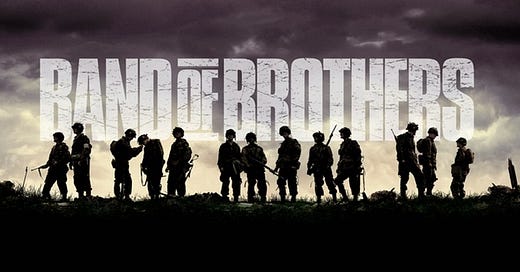Band of Brothers, the 10-part HBO series, debuted days before Black Tuesday in 2001. Looking back—I watched it for the first time last week—what’s best about Band of Brothers is a somber tone and reverence for the dead, maimed and walking wounded. The pre-steaming cable TV series of stories about young Americans bonding during the Allied invasion of Europe during what’s become known as the Second World War shows the horror of war. It’s especially relevant as America seems to be careening toward sending young Americans to fight yet another war in Europe.
Based on Stephen Ambrose’s bestselling 1992 book (which excerpted soldier accounts including diaries), created by Tom Hanks and Steven Spielberg and written by Erik Jendresen, John Orloff and Hanks, among others, Band of Brothers is thoroughly modern in the worst sense. HBO’s BBC-co-funded series is naturalistic. It’s like watching a hybrid of a documentary and a slice of life series. It’s non-philosophical and, in stretches, it is expl…
Keep reading with a 7-day free trial
Subscribe to Autonomia to keep reading this post and get 7 days of free access to the full post archives.




